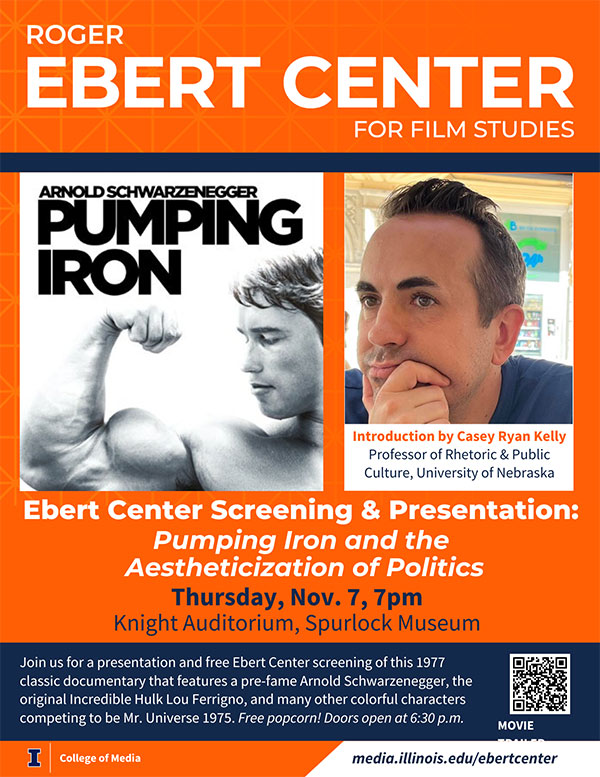Ebert Center Screening: 'Pumping Iron' and the Aestheticization of Politics
Knight Auditorium, Spurlock Museum, 600 S. Gregory, Urbana

The 1977 classic documentary Pumping Iron catches a pre-fame Arnold Schwarzenegger and original Incredible Hulk Lou Ferrigno and many other colorful characters competing to be Mr. Universe 1975. If you like Love Lies Bleeding (Glass, 2024), sports documentaries, 1980s action movies, and Conan the Barbarian vs. the Hulk, Pumping Iron is for you. Free popcorn! Doors open at 6:30 p.m.
Introduction by Casey Ryan Kelly, Professor of Rhetoric & Public Culture, University of Nebraska.
About the Topic
Pumping Iron (1977), a documentary about the 1975 Mr. Olympia and Mr. Universe competitions, cemented Arnold Schwarzenegger as a household name and popularized the subcultural sport of bodybuilding. But, more recently, bodybuilding and extreme fitness have become central preoccupations for the contemporary digital far-right who valorize the golden-age bodybuilder aesthetic, diet, and lifestyle as the masculine embodiment of white nationalism. How was a quirky sporting subculture appropriated into far-right politics? Why does the far-right view bodies as indexes of national health and morality? Although neither bodybuilding nor the documentary share an inherent relationship with far-right politics, the 1977 film offers some clues as to how the superlatively capacitated male body lends itself to what Walter Benjamin called the “aestheticization of politics,” wherein democratic governance and civil society are supplanted by mythologizing visual spectacles of violence.
About the Presenter
Casey Ryan Kelly is Professor of Rhetoric & Public Culture in the Department of Communication Studies. He is also Editor-Elect of the Quarterly Journal of Speech. He researches the political and cultural rhetoric of the U.S. far right, primarily through the lens of psychoanalytical theory. He has also published work on the rhetoric of white masculinity in film, television, and far right digital culture. He is author of five books including Apocalypse Man: The Death Drive and the Rhetoric of White Masculine Victimhood (OSU Press, 2020), Caught on Tape: White Masculinity and Obscene Enjoyment (Oxford UP, 2023), and Manifesting Violence: White Terrorism, Digital Culture, and the Rhetoric of Replacement (coauthored with William Sipe, University of Alabama Press, 2025). He is current completing a book manuscript entitled Habeas Musculi: Muscularity, Fitness, and the Body Rhetorics of the Far Right which examines relationship between rhetorics of physical fitness, masculinity, and white nationalism.
This following presentation will be happening the next day, in partnership with the Department of Communication:
Communication Colloquium: Necrofeminism and Television’s Take Charge Woman
Friday November 8, 3:30 p.m., 1092 Lincoln Hall
Kristen Hoerl, Associate Professor of Rhetoric & Public Culture, University of Nebraska
Hoerl will discuss her current book project which argues that television’s fascination with “strong women characters” paradoxically illuminates its inability to imagine a feminist alternative to contemporary social life under late capitalism. Via an analysis of television series featuring women antiheroes including The Handmaid’s Tale, Game of Thrones, and Queen of the South, Hoerl explains that the spectacle of racism and violent misogyny grounds public culture’s attachment to the figure of the can-do women whose agency depends on her own ability to mete out death to others. Engaging literature in rhetoric, feminism, and television studies, Hoerl suggests that television has begun to reckon with the paradoxes of neoliberalism even as it fails to offer developed stories of intersectional feminist agency.
Bio: Dr. Hoerl is Associate Professor of Communication Studies, focusing on Rhetoric and Public Culture at the University of Nebraska-Lincoln. Her research critically analyzes popular film and television as resources of public knowledge about social activism responding to white supremacy, patriarchy, and neoliberalism. Her book The Bad Sixties won the 2018 Best Book award from the American Studies Division of the National Communication Association. Her work also appears in a variety of journals including the Quarterly Journal of Speech, Communication and Critical/Cultural Studies, Critical Studies in Media Communication, Text and Performance Quarterly, The Review of Communication, and Communication, Culture, and Critique. She is a past editor of Women's Studies in Communication, a national, quarterly, peer reviewed journal for feminist communication scholarship; and past chair of the Rhetorical and Communication Theory Division of the National Communication Association.
